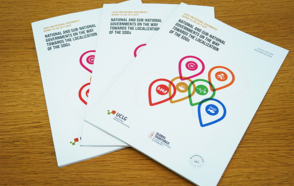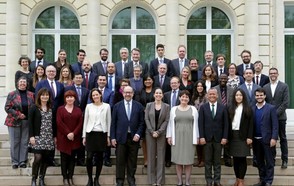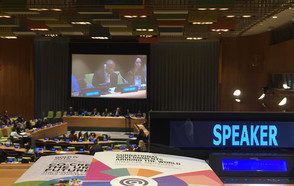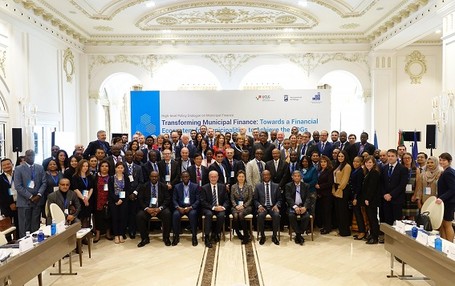
Photo credits: @CifalMalaga
On April 9, 2018, Parks Tau, President of UCLG, Judith Karl, Executive Secretary of the United Nations Capital Development Fund, and Francisco de la Torre, Mayor of Malaga led the discussion of the High-Level Dialogue held in Malaga. For UCLG, the meeting was an important step forward as part of its Finance Strategy to Reshape Local Finance.
The High-Level Dialogue, convened by United Nations Capital Fund (UNCDF), the city of Malaga and UCLG, brought together partners with the common purpose and understanding, that it is necessary to reform financial mechanisms and regulatory frameworks to trigger a paradigm shift towards the ‘Localization of the Sustainable Development Goals’ (SDGs). These partners are the first members of a global coalition advocating for the implementation of an enabling environment for cities to fulfil their potential as development partners and continue innovating to finance climate-compatible, sustainable urban infrastructure.
David Jackson, Director of UNCDF Local Development Finance, set the scene for the day. Three roundtables adopted the specific viewpoint of local governments, national governments and financial institutions. The fourth roundtable launched a global coalition of cities, their associations and networks and financial institutions that will advocate for a transformation of Municipal Finance by showcasing innovations that are being implemented and new financing windows of opportunity.
Emilia Saiz, Secretary General of UCLG, reminded participants of local governments’ commitment to the global agendas and underlined that under UCLG leadership, the global coalition would set into motion UCLG’s Finance Strategy, to map available mechanisms and innovative initiatives, develop an advocacy campaign to re-think local finance and engage into further partnerships.
The perspective of local governments to re-think Municipal Finance at national level
As President Parks Tau highlighted in his address, it is time for the international community to admit the insufficient allocation of resources to meet the challenges of sustainable urban development, and, the importance of reforming legislative frameworks to open the door to sovereign grants and the equitable distribution of financial flow.
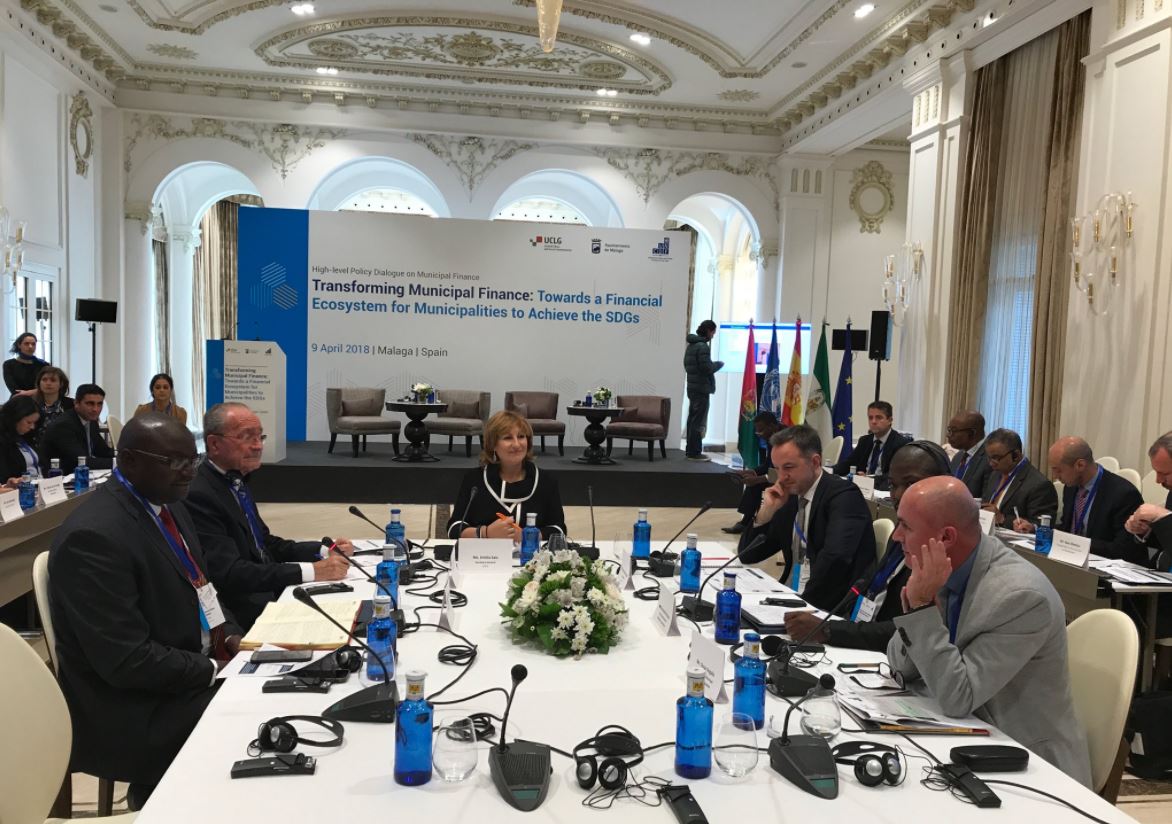 Parks Tau also stressed the need to monitor the commitment made by Member States in paragraph 34 of the Addis Ababa Action Agenda. Within the framework of the global agendas, Local and Regional Governments investment and budgeting are part of the needed paradigm shift. From the local level, innovative practices emerge, such as implementing inclusive and participatory decision-making mechanisms (SDG 16.7) or enhancing financial instruments to access Climate Finance.
Parks Tau also stressed the need to monitor the commitment made by Member States in paragraph 34 of the Addis Ababa Action Agenda. Within the framework of the global agendas, Local and Regional Governments investment and budgeting are part of the needed paradigm shift. From the local level, innovative practices emerge, such as implementing inclusive and participatory decision-making mechanisms (SDG 16.7) or enhancing financial instruments to access Climate Finance.
Roundtables showcasing the viewpoint of national governments and financial institutions revealed that there is a need to enhance the multi-level governance framework. Partners from the OECD Development Center also mentioned the Observatory on Subnational Government Finance and Investment -a joint initiative of the OECD, UCLG, UNCDF with the support of the French Development Agency – as a necessary tool to better assess devolution of responsibilities and matching ability to mobilize internal and external resources.
Lastly, as UCLG President stressed the next important step is for international and national regulatory frameworks to guarantee an enabling environment, institutional capacities and sufficient financial innovation for long-term investments in sustainable infrastructures and basic services.
Working towards a coalition, led by UCLG, in support of Municipal Finance
The final roundtable was focused on defining the basis of a global coalition of partners to transform local finance and the narrative underpinning policy dialogues. Emilia Saiz emphasized that under UCLG leadership; the coalition would work in synergy with the on going UCLG Strategy on ‘Reshaping Local Finance’. The purpose is to map existing practices and innovations, re-think financial mechanisms and join a global campaign to acknowledge the instrumental role of Local Finance as a means to achieve the SDGs. The coalition would also play a strategic role in furthering partnerships among its members.
Within this framework, Octavi de la Varga, Secretary General of Metropolis, and Jean-François Habeau, Executive Director of the Global Fund for Cities Development (FMDV), emphasized the need for partners to work towards a more collaborative approach of multi-level governance systems. The coalition should reinforce trust among partners and seek financial innovation at all levels, as the universality of the SDGs requires us to do.
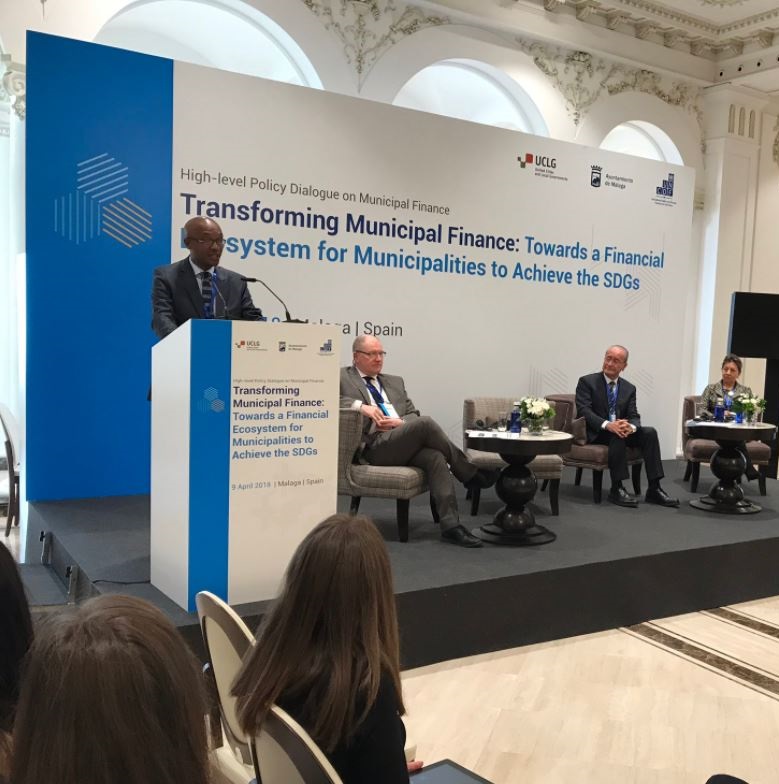
In his closing remarks, Parks Tau challenged the participants to re-think financial instruments and mechanisms for them to channel more efficiently the available funds to local governments to invest in climate compatible, sustainable, urban infrastructure. UCLG will contribute to the new global coalition to reshape the financing of sustainable urbanization based on local experiences for a global vision.
The next day, the City of Malaga, hosted a meeting on Cities and Migration. UCLG members from several regions actively participated in the debate. Abdoulaye Thimbo, Mayor of Pikine and member of the policy council on the Right to the City and Inclusive Territories, and Carola Gunnarsson Mayor of Sala and CEMR Spokesperson on Cohesion Policy, stressed the need to exchange real experiences. Carlos Martínez, Mayor of Soria and UCLG Vice President for Europe, presented the work already developed by CEMR and called on the participants to build a strategy based on the work of all networks following exemplary footsteps of the city of Malaga. He further made special reference to the importance of a full-fledged strategy focussing on the Mediterranean.
UCLG is committed to work with UNCDF to continue developing more knowledge on Migration and new financial instruments to harness its positive impact for local economic development.











